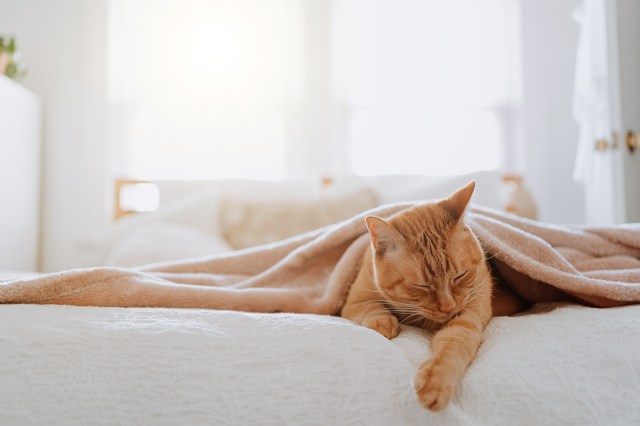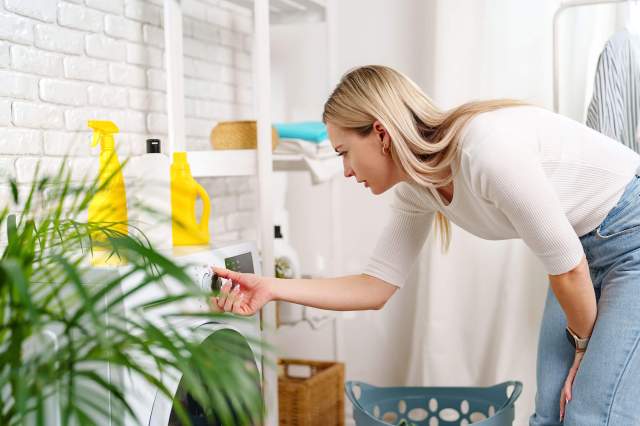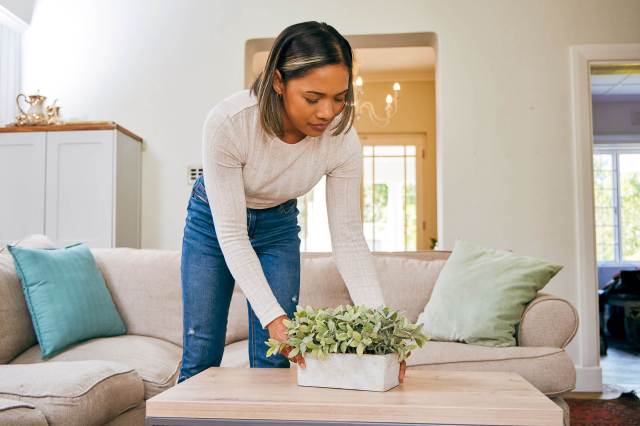As famed novelist Charlotte Brontë once said, “A ruffled mind makes a restless pillow,” and no one likes a restless pillow. But it’s not just our internal stress that can affect our sleeping patterns — often, our external environment isn’t conducive to a restful night’s sleep. That’s why it’s crucial to create a soothing bedroom environment. After all, it’s the room we spend the most time in. We’ve rounded up the most important tips from sleep scientists, doctors, and feng shui experts to help you transform your bedroom into a sanctuary for sleep. These are six bedroom rules that everyone should follow.
All featured products and deals are selected independently and objectively by the author. Better Report may receive a share of sales via affiliate links in content.
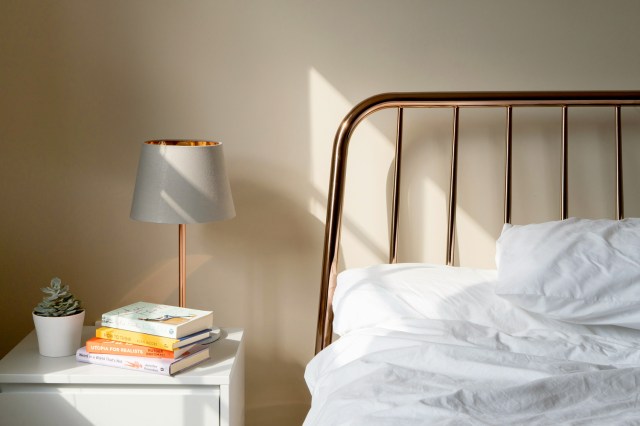
Pay Attention to How You Arrange Your Bed
Where you put your bed matters. According to the ancient Chinese practice of feng shui (which promotes peace and harmony through interior design), where your bed is located is crucial for a good night’s rest. “From a psychological viewpoint, it’s important to keep the bed as far as possible from the door while still making sure the door can be seen from the sleeping position,” says psychologist Natalya Mikhailova. This comes from humans’ primal need to sleep in a secure location. While placing the bed diagonal from the door is best, being directly in front of the door is the worst. This stress-inducing layout is known as the “coffin position.” When picking what wall to put your headrest against, consider these feng shui practices: south-facing promotes wealth, and east-facing is associated with better health and memory.

Separate Work and Leisure
These days, the lines between work and play are blurred, and many people use their bedroom as an office. During the COVID-19 pandemic, around 40% of people reported working from their beds at some point. However, the Sleep Foundation warns against using your bedroom as a work environment, explaining that it creates unhealthy associations and makes it harder to mentally disconnect when you need to fall asleep. Even bringing your laptop into bed to check emails can increase the time it takes to drift off. If this sounds impossible due to limited space at home, try to situate your work desk as far away from your bed as possible, and never do work from your bed.
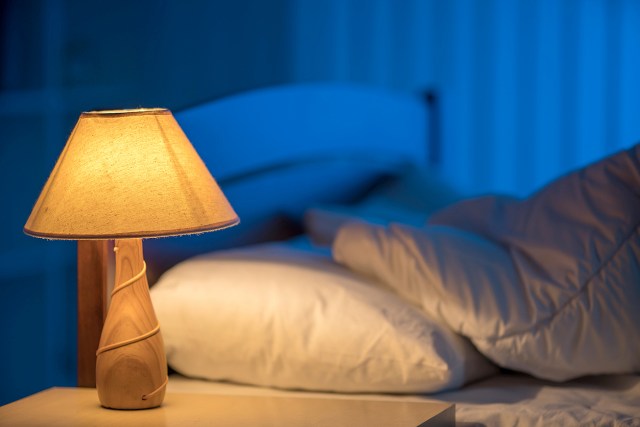
Hit the Lights
“Too much light can impact the quality of our sleep,” says sleep disorder specialist Dr. Reena Mehra. Reducing light in the bedroom allows you to fall asleep faster and stay asleep longer. Easy ways to make your room darker include closing doors exposed to hallway lights, using a sleep mask, investing in blackout curtains, and avoiding night lights (if possible). According to one study, people exposed to more light at night were likelier to report excessive daytime sleepiness and impaired functioning. This is because overexposure to light messes with your sleep cycle, causing your body to think it’s time to be awake. A dark bedroom creates a natural nighttime environment that our bodies are wired to respond to by sleeping.
Tip: If you or your children have trouble falling asleep without a night light on, consider investing in one with a timer or motion sensor.
Reader Favorites
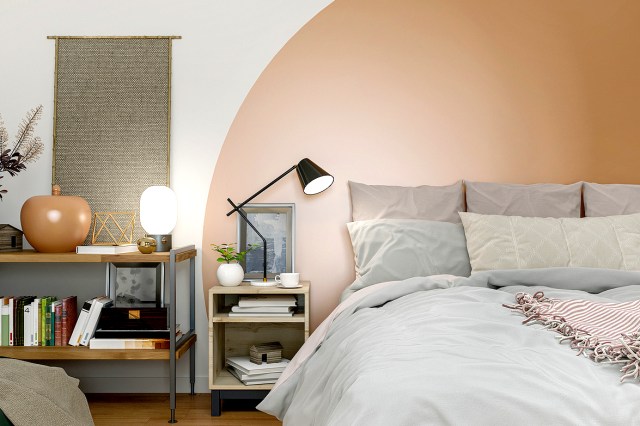
Pick Your Paint Wisely
Thinking of redecorating soon? Paint colors aren’t just for aesthetics; they affect how we feel. Sleep psychologist Sue Peacock says, “Some colors may evoke relaxation, while others stimulate your mind and make you more awake.” According to studies, the best bedroom color is blue, which calms your brain. Blue has even been shown to decrease heart rate in scientific studies. Because of this, neutral, muted, nature-inspired colors are best for the bedroom.
Brighter colors, such as red or yellow, have been shown to increase heart rate. For this reason, it’s best to avoid bright, neon colors in the bedroom, not only for paint colors but also for major accents. This might mean moving a bright painting into the living room or swapping that yellow bedspread for a sage green one.
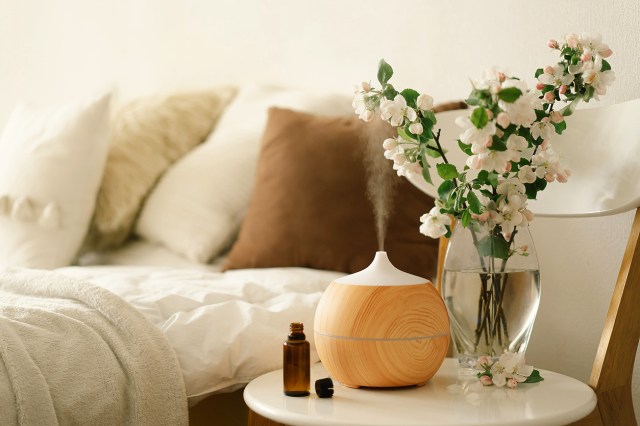
Skip Harsh Scents
Scent affects our sleep as well. Psychologist and sleep specialist Dr. Shelby Harris says that aromatherapy, such as scent diffusers, can help you fall asleep faster. Opt for soothing scents that won’t overwhelm, such as lavender, ylang-ylang, or chamomile. According to Sara Panton Rogier, author of Essential Well Being: A Modern Guide to Using Essential Oils in Beauty, Body, and Home Rituals, using the same scent every night can foster better sleep. She explains, “Creating consistency with aroma is important. For example, using the same aroma every evening to scent your bedroom before sleep helps the brain and body understand that it’s time to get ready for bed.”
Safety tip: Keep candles out of the bedroom. Falling asleep with an open flame is a major fire hazard.
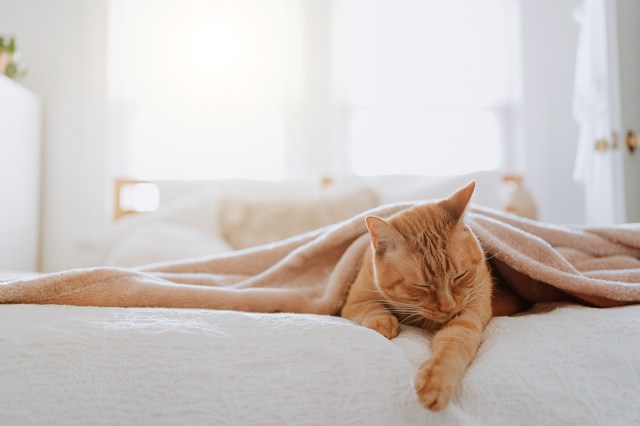
The Pet Problem
Pets are part of the family, and if you’re like most Americans, you sleep with at least one pet in the bedroom. Recommendations regarding pets in the bedroom are mixed. It’s a “don’t” for some pet owners and a “do” for others, depending on what you and your family need. If you have pets, there are a few things to consider.
Don’t let your pets sleep with you if:
• You have allergies. Millions of Americans are allergic to their pets, but that doesn’t mean we love them any less. However, limiting your exposure to pet hair and dander can help reduce allergic reactions and help you sleep more comfortably.
• Your pets go outside. Dirty pet paws can bring bacteria and parasites into the house and, in turn, into your bed. This is especially important for immunocompromised pet owners.
• You’re a light sleeper. Many pets keep their owners up at night by licking their paws, stirring, or snoring. If this sounds all too familiar, consider moving your pet into a different room or even into their bed on the floor.
Do let your pets sleep with you if:
• You want emotional support. Studies show that many people suffering from mental health conditions or post-traumatic stress disorder experience better sleep when pets are in the room. Pets are proven to reduce cortisol levels and increase oxytocin levels, both relaxing us.
• You want to improve your immune system. Sleeping with a pet might heighten immunity (for owners who aren’t immunocompromised). Exposure to bacteria and other microorganisms might benefit our overall health.
Featured Image Credit: GabrielPevide/ iStock
